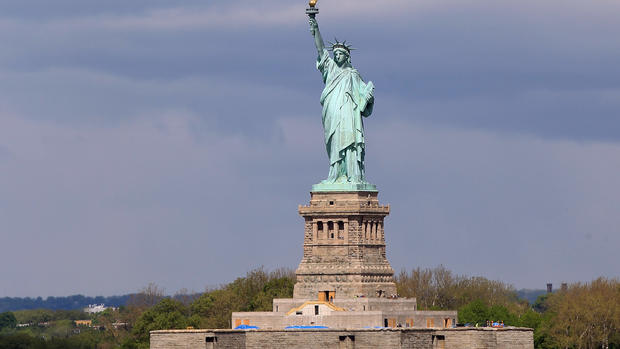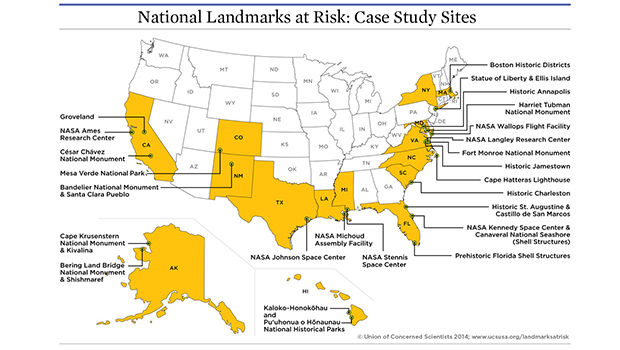Climate change threatens U.S. landmarks, report says
Climate change is putting the Statue of Liberty, Ellis Island, Cape Canaveral and 27 other historic U.S. sites at risk, according to a new report from the Union of Concerned Scientists (UCS).
Other sites threatened include Boston's Historic District, St. Augustine, Mesa Verde National Park and the Cesar Chavez National Monument, as well as cultural heritage sites in Hawaii. The first permanent English settlement in the Americas, Jamestown, could be completely submerged by rising seas by the end of this century, the report says.
"Sea-level rise, coastal erosion, increased flooding, heavy rains and more frequent large wildfires are damaging archaeological resources, historic buildings and cultural landscapes across the nation," according to the report, which is a call to action to better protect the landmarks and take steps to address the causes of climate change.
Sea levels have risen 1-2 feet along parts of the East and Gulf Coasts. Global sea levels are expected to rise another foot by the end of the century according to a report from the United Nations. The decade from 2001 to 2012 was warmer than any previous decade in every region of the country, looking as far back as 1901.
"You can almost trace the history of the United States through these sites," said Adam Markham, director of climate impacts at UCS and report co-author, in a press release. "The imminent risks to these sites and the artifacts they contain threaten to pull apart the quilt that tells the story of the nation's heritage and history."
The UCS, a non-profit science advocacy group based in Washington, D.C., conducted a case study on the preparedness of each of the 30 historic sites.
"Fort Monroe in Virginia, which played a crucial role in the fall of slavery, will become an island unto itself within 70 years," added Markham. "Castillo de San Marcos, in St. Augustine, Florida, also is extremely vulnerable."
Protective measures need to be taken, such as building barriers to protect against flooding. But even more importantly, says the report, more comprehensive measures need to be taken to address climate change. Earlier this year, a separate study determined that climate change is threatening UNESCO world heritage sites around the world.
"Cutting carbon emissions significantly and quickly can slow the pace of sea level rise, limit the temperature increases, and slow the expansion of the wildfire season," Angela Anderson, director of the Climate and Energy Program at UCS, said in the release.

